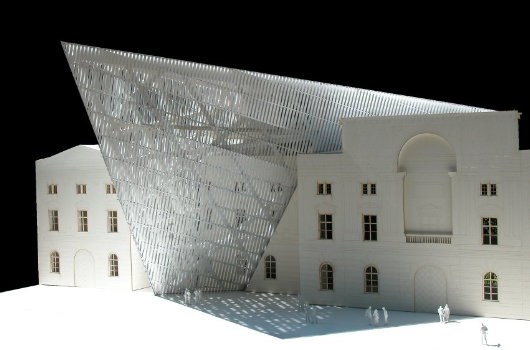
About Andrew Cusack
 Writer, web designer, etc.; born in New York; educated in Argentina, Scotland, and South Africa; now based in London.
Writer, web designer, etc.; born in New York; educated in Argentina, Scotland, and South Africa; now based in London. read more
News
Blogs
Reviews & Periodicals
Arts & Design
World
France
Mitteleuropa
Knickerbockers
Argentina
The Levant
Africa
Cape of Good Hope
Netherlands
Scandinavia
Québec
India
Muscovy
Germany
Academica

Libeskind Strikes Again, in Dresden
The controversial starchitect exacts Poland’s revenge on a German city
THE WAR WAS NOT kind to Dresden: the bombers of the Royal Air Force and the U.S. Army Air Force rained destruction on the Saxon capital, reducing much of the city to piles of rubble, and killing thousands upon thousands of innocent women and children in the process. One of the few buildings to survive the cataclysmic and morally reprehensible bombing campaign was the old garrison, which after the war was turned into a military museum.
Poland, whose unprovoked invasion by the Nazis sparked the Second World War, is exacting a curious revenge on neighbouring Germany, however. Daniel Libeskind, the controversial Polish starchitect, is building a monstrous addition to the Dresden Military History Museum that may not be a crime against humanity, but is undoubtedly a crime against architecture.

Libeskind’s addition to the museum takes the form of a jarring triangle, pointing in the direction from which the British and American bombers came to attack the city. “It is something like a lantern, a signal, a beacon that evokes the city itself,” Libeskind told the press. “It creates a question mark about the continuity of history and what it means. It gives people a point of reflection.”

Libeskind’s addition does not in fact include any significant increase in functioning exhibition space or working areas. It is more of a middle finger to the city.
“I cannot decide whether Libeskind has been brilliant or utterly appalling,” writes Simon Heffer of the Daily Telegraph. “I suspect he is the latter, though the mock-ups on his website of how the finished product will look are rather incredible: and there is a poetic justice about taking the only undamaged building from that night and allowing it to share in the proceeds of destruction in this way.”

The estimated cost of the project is €48,000,000, funded by the Federal Republic of Germany, which has chosen this institution to be the official military history museum of the country.

Up to this point, Dresden had become known for its commendable progress in rebuilding the historic structures destroyed during the war and left as rubble during the Communist period. The completion of the Frauenkirche (above, the Lutheran church of Our Lady) has been particularly applauded. But Libeskind attacks this progress, claiming that “sentimentality is not a foundation on which you can build a new city.” One is tempted to point out that Dresden is not a new city, having its origins in the late twelfth century, in a region that had been settled by the Linear Pottery tribes around 7500 B.C., but one suspects anything more than five minutes old is of little interest to Mr. Libeskind.
Rebuilding is not a policy of forgetting or ignoring the past but trying to recover it and safeguard it for future generations. While the Libeskinds of this world have no concept of relating to the past other than insulting it or erasing it, I hope cities the world over will, like Dresden, pursue a policy of coming to terms with the past instead.

Search
Instagram: @andcusack
Click here for my Instagram photos.Most Recent Posts
- Burns Tower April 19, 2024
- Patrick in Parliament March 18, 2024
- Articles of Note: 13 March 2024 March 13, 2024
- Cambridge March 9, 2024
- Taken on Trust March 4, 2024
Most Recent Comments
Book Wishlist
Monthly Archives
Categories



“morally reprehensible bombing campaign”
Absolute Bollocks.
“The Nazis entered this war under the rather childish delusion that they were going to bomb everyone else, and nobody was going to bomb them. At Rotterdam, London, Warsaw, and half a hundred other places, they put their rather naive theory into operation. They sowed the wind, and now they are going to reap the whirlwind.”
http://www.youtube.com/watch?v=KhmRrTsv55Y
Air Chief Marshal Sir Arthur Harris KCB
The Luftwaffe coined a new word, to “Coventrate” – after their annihilation of Coventry and “Coventry” was mentioned by many of Bomber Command when asked why they did their job.
Part of the motivation of later bombing raids such as Dresden may well have been a show of strength for the Soviet’s benefit, (and that came from Churchill, not Harris, Churchill doing a great teflon job on this after the war) but Harris’s objective was always to bring the war to as swift an end as possible minimising Allied casulties. He would have been more successful if Bomber Command’s resources were not diverted eleswhere as often as they were.
The Great War ended the concept of war fought on a battle field between armies, excluding civilians. It ended then and has been so ever since.
Forgive me: I hadn’t realised that if people do bad things to us, that means we can do it to them.
As stated above that was not the rationale, it was to bring the war to as swift an end as possible minimising Allied casulties.
The Nazi’s were clearly not going to negotiate an end to the war, it took almost a year to get from Normandy to Berlin, most estimates reckon you could have taken that to 4 or five years without Bomber Command’s destruction of the Nazi war machine, it may not even have been possible. 4 years fighting would have resulted in far greater loss of life, military and civillian on all sides.
War is cruelty. There’s no use trying to reform it, the crueler it is the sooner it will be over. William Tecumseh Sherman
Very well… for savages. But for Christians? No.
The intellectually dysfunctional Libeskind’s only real skill has been the ability to bamboozle institutions into allowing him to work out his divisive, sectarian and racist views about cultures (other than Judaism) in the form of hateful and monstrous architectural designs.
Readers who want to find out more about Libeskind’s polluted and reprehensible rantings, should familiarise themself with his tasteless, appalling and disgusting musings in his book entitled ‘Fishing From The Pavement’. Here’s a selection of what Daniel has to say about Christians, Moslems and other ethnic and religious groups Libeskind feels entitled to criticize: click here.
I suspect your suggestion of a Polish revenge has resonance. Effectively it is an inverted wedge dropped smack bang into the body of a German military museum renting it asunder. What else would a Pole design for a building that previously a housed a German garrison. Not terribly subtle but then Poles rarely are.
Libeskind tries to justify his design with the asinine remark: – “It creates a question mark about the continuity of history and what it means.”
Who is he trying to kid? His claims for his work are so utterly pretentious you can only feel embarrassment for him and the morons who associate with him. The only question mark is about how such a ridiculous fool conned the Germans into building this vulgar and hideous mixture of crass rationale and juvenile rhetoric.
“Very well… for savages. But for Christians? No.”
But are all non-Christians savages? I think not. And are all Christians non-savages?
Anyways, back to the main topic. I would just like to ask Mr. Libeskind a question. What have the Germans, or humanity in general, ever done to you to merit your perfunctory placement of such… as the perceptive Prince Charles once described a mercifully unbuilt work of yours… carbuncles.
I don’t think Christians are all necessarily savages, but I am one hundred percent certain that Daniel Libeskind (underneath those stupid black glasses and cowboy boots), is as ignorant and as unsophisticated a savage as ever existed. The only sign of intelligence he’s ever shown is when he hired Alexander Gorlin Architects to design the Libeskind family’s apartment in New York.
Appalling and boring at the same time.
Like all of Libeskind’s work, it has very little to do with the client’s program, or the place it is situated. On the other hand, it is a particularly fine expression of Libeskind’s vanity and his trademark ego.
Ironically, as Libeskind’s portfolio of appalling work shows, he has done as much damage and destruction to once beautiful buildings and cities as a well orchestrated blitzkrieg or Luftwaffe bombing raid. Libeskind is the architectural equivalent of the Nazis he claims he is superior to.
To avoid hijacking this com-box from the main thrust of your post, we will have to agree to disagree on what constitutes the legitimate means of a just war – as I assume you agree the war againt the Nazi’s was just – or we will end up beating the 60 posts on that post against the Byzantines over at Ex – Laodicea!
In respect of the proposed extension, there is obviously no equivalent of the Cockburn Association in Dresden – it took me 18 months to get planning for a hidden small satellite dish in Kings Stables Road in Edinburgh…
Alas, the Cockburn Association is little match for the starchitect. Indeed, it often seems that the more galling the offence, the easier it is to get away with. A satellite dish may be difficult to fix but oddly enough, planning permission for large-scale, vulgar hotel developments in the Old Town seems to be relatively easy to get ahold of.
Need we even mention the monstrosity placed directly opposite Her Majesty’s house?
This is an ironic mix of comments on bad architecture and bad battle mores. I suspect that one could find a logical path from the from the Renaissance and Reformation heresies, to the Enlightenment and thence (with some twisting and bifurcation) to ugly modernist buildings and to National Socialism–they are different phases of the same thing. Would destroying L’s monstrosity be the moral equivalent of the firebombing?
I guess I could see that there might have been a kind of virtue in the Brits of ’45 agreeing, in a spirit of ascetic reparation, to enduring an extension of the war effort to avoid contravening the highest principles of a just war. Oddly, however, we do not hear the monks and saints deplore Dresden, but the liberals whose intellectual forebears made it possible and probable and whom you, Andrew, have so carelessly supported by your unnecessary and intemperate quip. Dresden and Japanese atom bombs–if, indeed, they were avoidable and imprudent–are three drops in the sea of unspeakable evil used lenses of self-righteousness by those who who would weaken the West with relativism.
“Libeskind is the architectural equivalent of the Nazis he claims he is superior to.”
Well I don’t think we can compare bad architects to genocidal maniacs.
“Oddly, however, we do not hear the monks and saints deplore Dresden, but the liberals whose intellectual forebears made it possible and probable and whom you, Andrew, have so carelessly supported by your unnecessary and intemperate quip.”
Well, I guess you just haven’t been listening to the monks and saints who have condemned the intentional killing of non-combatant women and children.
On the subject of not Dresden but Hiroshima, I’ll refer you to a previous post of mine elsewhere (though my byline has mysteriously fallen away from it):
http://www.newcriterion.com/posts.cfm/do-ends-really-justify-means-4588
And we are not talking about “the highest principles of a just war”. On the contrary, we are talking about the most basic principles of waging war justly: that the innocent and non-combatants not intentionally be targeted.
(Of course, to be specific, we are discussing the jus in bello, not the just ad bellum. The horrific nature of some Allied tactics towards the end of the war in no way negates the justice of the Allied cause — the two are separate moral issues).
“Dresden and Japanese atom bombs–if, indeed, they were avoidable and imprudent–are three drops in the sea of unspeakable evil used lenses of self-righteousness by those who who would weaken the West with relativism.”
And of course nothing could be more relativistic than to disregard the basic precepts of Christian morality just because there happens to be a war on. Truth does not shut off at the point of a gun, though people might stop paying attention to it.
I have not “carelessly supported liberals”. Rather I have supported Christian morality, which some liberals bizarrely support on very rare issues such as this. If ‘a’ supports ‘X’, and ‘b’ supports ‘X’, it does not logically follow that ‘a’ supports ‘b’.
Giuliano Ferrara is an atheist liberal who is (quite committedly) against abortion. Am I then to support abortion for fear of “carelessly supporting liberals” like Signore Ferrara? The radical/pro-abortion/liberal National Organization for Women (N.O.W.) opposed the recent liberalisation of New York’s divorce laws. Should we have then supported the introduction of the no-fault divorce in opposition to them? Of course not.
One should not define one’s positions based on fairly useless terminology and pigeon-holing, but instead examining the issues at hand through the lens of Christian tradition.
Well Andrew, I am not such a big fan of Liebskind’s architecture. I am more interested in commenting on the morality of the bombings.
In “The Fog of War,” a documentary about the life of Robert McNamara, McNamara states that if the US lost the war he and many others could have been tried for crimes against humanity for the fire-bombings of Tokyo and other Japanese cities (and Dresden too, I suppose). There is no doubt that it is not morally the “right” thing to do. Then again, this is a war, the definition of which is that there will be people killing other people, a morally wrong action.
The problem is that in every one of these cases it’s an example of “us” vs. “them”: if we do not drop the bombs on Japan, victory will take longer and more US troops will die. Considering that even a negotiation with the Emperor may not have ended the war (generals were trying to wrest power from him) and the willingness of the Japanese to fight to the last man, the US made a strategically wise decision dropping the bomb. Was it terrible? Yes. Would it have been preferable to find another method? Yes. But do you honestly think a US general is going to put his own troops at risk to save the enemy? Maybe, but you are wrong. That’s the harsh reality of war.
Maybe instead of arguing about this it would be easier to just not go to war.
re: Dresden bombing
I regret not being more inarticulate. I anticipated the tenor of your response and that of the link you gave.
No one denies the horror of the fire-bombing. The moral character of it (its sinfulness) depends on the intent and knowledge of its perpetrators as well as upon the objective wrong of killing people. The mere possibility of a just war carried on by just means implies death and destruction or else it would not be war.
What I am trying to point to is the harmful gratuitousness of your reference to it. As Lewis said, we might not be able to walk perfectly straight, but we can keep from veering from one side to the other. Making Dresden continually and incessantly memorialize the moral failure of the Allies who, at the time (of the firebombing) were engaged in a real struggle with palpable, powerful and astutely focused evil, cannot but hamper the effort of what remains of Christendom’s active opposition to evil. “If our fathers could so err, what of us?” Or do you argue the living are more just than their ancestors?
Turning the other cheek might convert enemies and might bring on Our Lord’s return, but I, for one, am not up to it. I am not so confident of my position as one enjoying the unparalleled comfort and personal freedom secured by the Allied leaders and soldiers to rail at their faults and point to an isolated veering from the path of perfect justice. One might accuse St Louis of causing non-combattant deaths in the seige of Damascus. Fault it may have been (and I do not believe that any one of us has the knowledge or the right finally to say), but we cannot make it their emblem or continually throw it in the faces (or on the tombs) of them who courageously opposed the evil they could see.
Perhaps you can illustrate your thinking on our government’s reprehensibility, in a shorter historical range, with a theory of how terrorism and Islamic fanaticism might be justly opposed. The same issues are present without the involvement of those who kept you and your parents from growing up as slaves of pagan empire.
Judging by your comments, the only thing you seem to be offended by in this blog post are the words “and morally reprehensible” in the second sentence.
From these simple words, written in passing, you seem to have extracted a massive campaign of support for “[m]aking Dresden continually and incessantly memorialize the moral failure of the Allies”. Did I propose that? (No.) Did anyone here say this would be a good idea? (No.) It is probably obvious to other readers that you are making mountains out of molehills.
You also have set up straw men that no one (here on this blog, that is) is supporting. For example, your talk of turning the other cheek, which no one suggested. Another example: did anyone here claim that war was possible without death and destruction? Again, no.
If you support the intentional killing of innocent civilians and non-combatants, fair enough: you can use your free will to support whichsoever horrors you choose. But calling these three words (“and morally reprehensible”) “harmful gratuitousness”? Come now… that’s just silly.
The basic point is this: we’ve made mistakes. We should atone for it and get over it. But we musn’t try to excuse it as morally justifiable.
“But do you honestly think a US general is going to put his own troops at risk to save the enemy?” — Brad
To save the enemy? No, I don’t think he is going to, nor should he. But to save innocent people? Yes, I do think he should. Do I think a US general would? Doubtful. This is a deracinated post-Christian culture and I expect nothing but more corruption and decay from our (political, military, financial, social…) establishment.
But do remember: the “enemy” are the combatants, not the non-combatants.
“Then again, this is a war, the definition of which is that there will be people killing other people, a morally wrong action.”
False: killing in self-defence is not morally wrong. When you wage war in self-defense (e.g. your home is invaded), it is morally justifiable (though, as noted in comments above, you can commit morally unjustifiable killings while justifiably taking part in a war).
re: we’ve made mistakes
I think we’re getting together here. Reprehension was irrelevant to the subject of your article. “We” did not reprehend ourselves there, but reprehended others doing a grisly job under unimaginably difficult circumstances. I agree (at least on the level of theory*) with what you say but deny your right (in an article about architecture) to say it.
As the French are said to say: It looks fine in practice, but how will it work in theory?
After the Nazis, Libeskind has done more to destroy the culture and character of cities than any other destructive force. He is a disgrace to humankind. He and his work disgust me.
Le Corbusier and Gropius were much worse than any Nazis or Soviets. As are Libeskind, Gehry and their ilk- all mostly Polish architects.